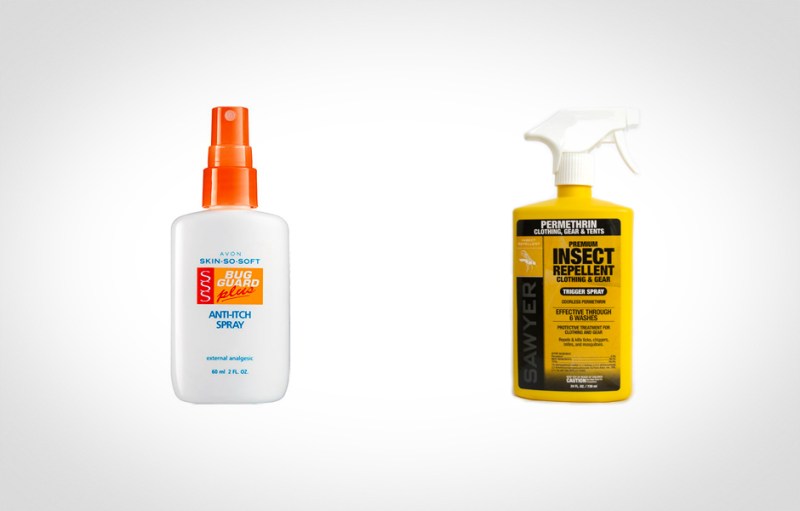
1—Use Bug Spray Correctly
First rule: Sunscreen first, bug spray second. Be sure to apply it to every millimeter of exposed skin and choose wisely. The US Army prefers Deet and if you’re heading out into the woods, so should you. Go no less than 20% and keep the 100% stuff for swamps, marshes and malaria zones. The stronger the dose, the longer it lasts. You can also go with another chemical called Picadarin, an old European favorite, which is gaining popularity in the US. It hasn’t been proven to be any more or less effective than Deet, though it’s slightly less toxic. If you’re just hanging out at the pool, beach or a backyard BBQ, Skin So Soft (or any product using the ingredient IR3535) should do the trick without repelling people as well. Naturalists have a laundry list of herbs they say clear the air of bugs, but lemon eucalyptus oil is recommended by the CDC and the most effective for mosquitos, cedarwood or tea tree oil fights fleas and rose geranium, juniper and thyme keep ticks away. And then there’s Catnip oil, which is said to be ten times more effective than Deet…but that might be because you’re also covered in cats.
2—Clip Off
So there are these new-ish clip on devices that emit a vapor of insecticide and metofluthrin (don’t ever try to say this word after a pool side beer or two) and claim up to 11 hours of protection. Studies have found they offer about two hours and have made some people sick. And what of the use of high-frequency sounds to ward off mosquitos? Bogus, say scientists. You’d have better luck tricking the pests into thinking it’s winter by playing the Chipmunk’s Christmas.
3—Complete Your Cover with Clothes
Clothes keep you from being naked, with the added benefit of helping to stop bug bites. Thing is, you have to do more than just wear them. If you’re parading through tall grass (the preferred habitat of lyme disease-carrying ticks), shrubbery and thick woods (especially near stagnant water), dork it up—tuck in everything (including pants into socks). But even that’s not always enough; some mosquitoes like the Asian Tiger Mosquito and one in South Florida called Gallinipper are big enough to get through your threads. If you’re in an aggressive bug zone, you’ll want permethrin treated clothes. Buy ’em pre-treated or do it yourself (just don’t ever put this stuff directly on your skin). Lastly, clothes can be good camo; you’re easier for biters to see when you’ve got on dark clothing, so dress in light, neutral colors.
4—Shock Therapy Doesn’t Work
A Rutgers University study shows that only 1% of the insects drawn in by the death light of a bug zapper are actual biters.
5—Survey Your Screens
Ever wonder how you got those mosquito bites on your butt without ever having been undressed outdoors? They might have gotten into your house though a small tear window screen. Same goes for your tent.
6—The Doors
Are a great band for summer road trips. But the ones on your home should open outward and have automatic closing devices to make it harder for bugs to get inside.
7—Mow the Lawn, Trim the Shrubs
Mosquitoes, fleas and other such parasitic insects thrive in the shade of your yard. Landscape your home and reduce their habitat.
8—Fan Favorite
Bugs are much better at biting than they are at flying. If there’s a fan available, standing near it reduces biting possibilities greatly. (Notice you never get bitten when it is windy outside?)
9—Walk Away from the Water
Standing water is where adult mosquitoes make baby mosquitoes and where you are sure to get bitten. If you’ve got a pond in your backyard, stock it with goldfish—they feast on mosquito larvae. And if you have a fountain or water feature with no fish involved, add a bit of white vinegar into the water every week. It will prevent larvae from growing.
10—Don’t Worry B Happy
While not completely conclusive, some scientists have found that taking between 50 to 100mg of vitamin B-1 or Thiamine, helps repel mosquitos. The vitamin is released though sweat and is thought make your smell less appealing.
11—Fire
Being a pyro has its plusses—smoke of any sort deters biting insects. From campfires to church candles, they all work. If you’re spending a lot of time outside, incense coils with malathion or permethrin are the most powerful in avoiding mosquito bites.
12—Don’t Sweat It
No really. Shower often. Wear deodorant. Change your socks. Clean your underwear. To bugs, your sweat is like bourbon. They’ve actually got a sweet tooth for the lactic acid present in your sweat (especially the yellow fever mosquito), so no more running out of the gym without taking a shower. Also, make sure to avoid any grooming products that use Alpha Hydroxy, which is a form of lactic acid. It’s up to you if you want to go with cologne or a scented soap; scientists don’t agree if this helps or hurts your cause.
13—Stand Still
Insects are attracted to movement.
14—Garlic
Eating garlic won’t keep the bugs away, but if you’re really into the smell, rubbing some on your skin will keep them (and probably other people) away for about 20-40 minutes.
15—Timing
The inconvenient truth about mosquitos is that, in general, their favorite time of day to eat happens to coincide with the same times dermatologists say its best to be out in the sun—morning and evening.


